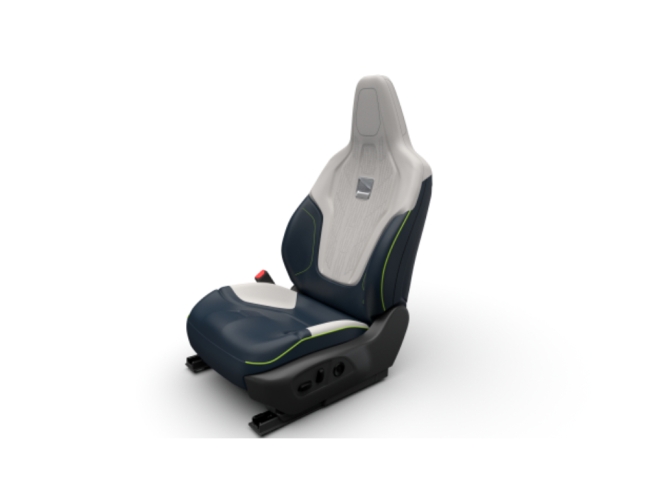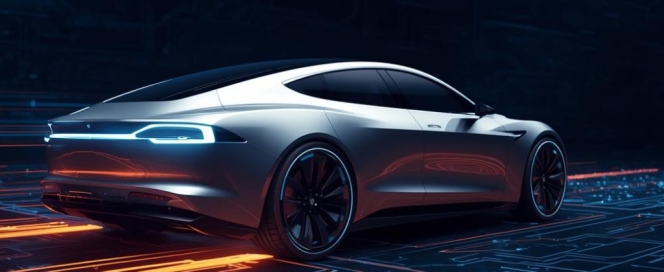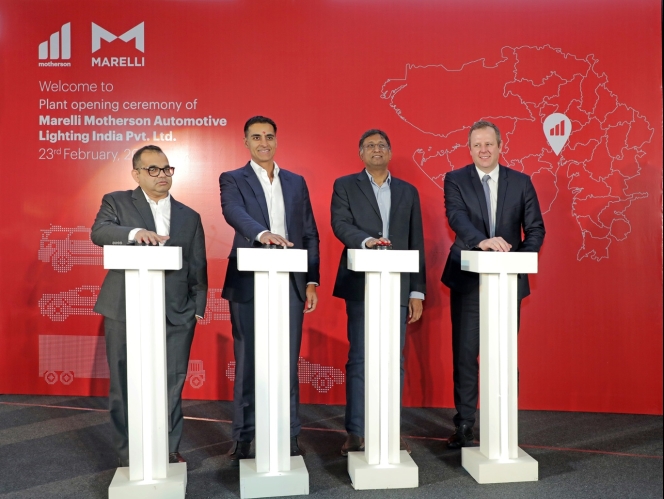Enhancing In-Cabin Experience With Smarter Chips
- By Gaurav Nandi
- January 20, 2025

Texas Instruments unveiled four integrated automotive chips in a virtual event, designed to reimagine in-cabin experience for both drivers and passengers. The high-tech chips were also showcased at the Consumer Electronics Show 2025 held in Las Vegas. The line-up included the AWRL6844 millimetre-wave radar sensor with AI-enhanced safety features, the AM275x-Q1 MCUs and the AM62D-Q1- a family of MCUs featuring the powerful C7X DSP core for premium audio- and the innovative TAS6754-Q1 audio amplifier with proprietary 1L modulation technology.
Alluding to the matter, a company official said, “The new-age automotive chips centre around advanced driver assistance systems (ADAS) and infotainment and cluster. As consumers, we expect a lot from our vehicles and this innovation is driven by two key factors. First, new government regulations and car assessment programmes mandate improvements in passenger safety, requiring more accurate and robust in-cabin sensing systems to monitor a variety of situations. Second, there is a growing demand for premium audio experiences as in-car systems now often surpass home audio systems in quality, delivering unparalleled experiences across a wide range of vehicles.”
“Our silicon solutions are designed to empower designers to enhance the overall in-vehicle experience without compromise. To that end, we are excited to debut three new automotive products,” he added.
Radar sensor
The AWRL6844 is designed to help customers deliver a safe and feature-rich user experience. It aims to enhance the user experience visually and improve safety. The company highlighted that OEMS face challenges in meeting stringent requirements while minimising cost and design complexity. Moreover, requirements for transference detection would award points only for direct sensing systems capable of detecting the presence of a human inside a vehicle by tracking signs of life such as artery aspiration rates and movements. Future in-cabin sensing systems would need to accurately differentiate between children and adults to enhance user experience and safety.
The AWRL6844 is the industry’s first single-chip solution that supports these three key applications, which has been achieved through the integration of AI into the silicon, claimed the company.
The sensor integration was said to provide optimal spatial resolution, delivering dense point cloud data for applications in a cost-effective manner while leveraging edge AI processing. This high-resolution data feeds into AI-driven algorithms on a customisable, on-chip auto accelerator and DSP, enabling local data processing. This approach, allows automotive systems to achieve advanced sensing with a single chip solution, reducing system cost and complexity.
The AWRL6844 will help OEMs could deliver seamless detection, validation and classification, simplifying sensing topologies and modalities used today or in the future.
For instance, the system can detect localised occupants with up to 98 percent accuracy to minimise detection errors. This eliminates uncertainty related to seatbelt detection when a non-human object is on the seat. When the car is parked, the sensor uses neural networks to classify adults and children with high accuracy, trained to detect micro-movements and distinguish between them. The device also enhances detection in blind spots, preventing children from being left unattended in vehicles.
Audio processor
On the other hand, the AM275x-Q1 MCU and AM62D-Q1 processors enable leveraging advanced audio features that enhance in-cabin experience. Another company official noted, “Audio is increasingly used in cars to enhance safety with features like door chimes and seatbelt reminders as well as to improve passenger comfort across vehicle fleets. These features are no longer limited to luxury vehicles. Our solutions bring premium audio capabilities across the entire OEM vehicle line-up, leveraging a unified software investment.”
“At the core of this innovation our C7x DSP core. It supports a higher number of speakers and multiple audio zones, delivering high-quality sound throughout the vehicle. The C7x DSP achieves 4-8 times the processing performance of competing devices, enabling the management of multiple audio features within a single core, thus reducing the need for external components,” the official added.
The C7x DSP’s performance is made possible by its 256-bit vector architecture and single-cycle memory access, alongside pipeline optimisations that drive industry-leading audio benchmarks. Additionally, the integrated neural processing unit allows customers to develop and execute AI algorithms on the same platform. This high processing capability reduces component requirements for automotive audio systems while enabling advanced features like real-time tuning, spatial audio and latency-reduced ANC.
“This is especially critical for EVs, which often lack passive sound-dampening materials, relying instead on active solutions to maintain cabin quietness. TI’s solutions also support Acoustic Vehicle Alerting Systems (AVAS) for external pedestrian alerts, making them integral to modern EV designs,” added the official.
The AM275x-Q1 MCU is a DDR-less single-chip solution tailored for high-performance audio applications, supporting up to 32 channels. Its integrated 4.5 MB SRAM and up to 6 MB L3 memory eliminate the need for external memory, reducing system complexity. In contrast, the AM62D-Q1 processor is DDR-based and suited for applications requiring large memory sizes such as high-resolution playback or simultaneous AI and audio processing. With a high-speed DDR4 controller, it ensures real-time compute capabilities and smooth performance.
The company claimed that both chips will enable engineers to design premium audio systems with minimal investment in hardware and software.
The TAS6754-Q1 Class D amplifier’s modulation technology reduces the number of required inductors by half. This advancement enables more compact, lightweight and cost-efficient designs without compromising audio quality. Additionally, the amplifier incorporates real-time load diagnostics, streamlining design processes and enhancing efficiency to meet OEM demands effectively.
Commenting on the new products, Senior Vice President of TI’s Embedded Processing Amichai Ron said, “Today’s drivers expect any car – entry-level to luxury, combustion to electric – to have enhanced in-cabin experiences. TI continues to provide innovative technologies to enable the future of the automotive driving experience. Our edge AI-enabled radar sensors allow automakers to make vehicles safer and more responsive to the driver, while our audio systems-on-chip elevate the drive through more immersive audio. Together they create a whole new level of in-cabin experiences.”
The chips are available at the company’s website.
Adient Introduces Sculpted Soft Trim Technology For Automotive Seating
- By MT Bureau
- February 26, 2026

Adient, a supplier of automotive seating, has launched Sculpted Soft Trim, a manufacturing technology designed to provide new design options for vehicle interiors. The product is a breathable, formed trim solution that can be applied to large panels or components such as armrests, headrests and child seat anchor covers.
The technology uses an automated forming process to create shapes, reducing the requirement for traditional manual sewing. This method allows for the creation of concave surfaces and 3D shapes that were previously difficult to execute using standard cut-and-sew techniques.
Sculpted Soft Trim is designed to improve craftsmanship while lowering labour requirements. In applications such as rear seat child anchor locations, the system can replace up to twelve individual patterns and sew lines with a single formed component.
Key features of the technology include:
- Material Compatibility: Support for a range of fabrics and vinyl materials.
- Surface Detail: Capability to achieve 3-dimensional concavity without losing grain detail.
- Customisation: Ability to add embossed or debossed textures, graphics and badging within the same tooling process.
- Material Integration: Facility to pre-sew and form dissimilar materials together.
- Firmness Control: Variable firmness options to meet specific application requirements.
Adient has confirmed that Sculpted Soft Trim is available globally. The technology is scheduled to enter production on vehicles from several original equipment manufacturers (OEMs) during 2026. According to the company, the process reduces cycle times by approximately 50 percent compared to traditional forming methods.
Mike Maddelein, Vice-President of engineering in the Americas, Adient, said, “Sculpted Soft Trim fundamentally changes what’s possible in seat trim design by combining premium aesthetics with meaningful manufacturing efficiency. With cycle times reduced to roughly 50 percent of traditional forming methods, this technology delivers both speed and quality. In addition, decorative sewing, quilting and embossed or debossed features introduce another level of specialisation, all executed with tight tolerance control to ensure consistent, high-end craftsmanship at scale.”
Dhoot Transmission, FourFront Join Forces For Integrated Electronics & Electrical Manufacturing Platform
- By MT Bureau
- February 24, 2026

Dhoot Transmission, backed by Bain Capital, has announced a partnership and merger with Pune-based FourFront. Under the agreement, FourFront will merge with a subsidiary of Dhoot Transmission to create an integrated automotive electronics and electrical manufacturing platform.
FourFront is a Tier-1 supplier providing electro-mechanical and electronic solutions to passenger and commercial vehicle manufacturers. The merger is intended to address the increasing electronics content in vehicles and the requirements of the electric vehicle (EV) sector.
The combined entity will leverage complementary capabilities in manufacturing and engineering. FourFront’s portfolio includes:
- Power Electronics: Components for voltage conversion and management in EVs.
- Electromechanical Switches: Interface solutions for vehicle cabins and systems.
- EV Products: Specialised hardware for electric drivetrains.
The platform aims to provide end-to-end solutions for original equipment manufacturers (OEMs) across internal combustion engine and electric vehicle programmes. Bain Capital will provide global automotive expertise to support the scale of the platform and the adoption of technologies such as Advanced Driver Assistance Systems (ADAS).
Rahul Dhoot, Managing Director, Dhoot Transmission Group, said, “This partnership is closely aligned with our strategy of building a differentiated automotive platform with strong capabilities in electronics and electrical systems. FourFront has developed trusted relationships with OEM customers and built meaningful expertise in power electronics. As part of the Dhoot platform, FourFront and its team will be well positioned to continue delivering the same level of quality and service levels to customers while benefiting from our scale, manufacturing depth, and long-term investment approach.”
Saahil Bhatia, Partner, Bain Capital, said, “India continues to be an economy with a strong long-term growth trajectory, supported by favourable demographics, rising domestic consumption, and sustained investment in manufacturing and infrastructure. Against this backdrop, we see a compelling opportunity to support platforms like Dhoot, and now FourFront, as they scale capabilities, deepen OEM partnerships, and build high-quality automotive solutions aligned with evolving technologies such as ADAS and increasing electronics content across vehicle segments.”
Shrikant Neurgaonkar, Chairperson and Managing Director, FourFront, stated, “Over the last 15+ years, FourFront has built very a strong foundation and is recognised for innovative solutions, superior design capabilities, and responsiveness towards customer demands. The partnership with Dhoot Transmission and Bain Capital will put us in a strong position to further enhance our product offerings and continue to invest in manufacturing facilities, R&D and people for the next phase of growth. We’re very excited to partner with Dhoot Transmission to create an electronics platform focused on technical and operational excellence.”
Marelli And Motherson Open Automotive Lighting Plant In Sanand
- By MT Bureau
- February 23, 2026

Marelli and its joint venture partner Motherson have inaugurated a manufacturing facility for automotive lighting in Sanand, Gujarat. This plant is the second facility for the Marelli Motherson Lighting India (MMLI) joint venture in the region and increases Marelli’s total footprint in India to 16 production sites and three R&D centres.
The facility focuses on exterior lighting systems for the passenger vehicle market. It introduces several technologies to India, including the production of single-piece lamps that span the full width of a vehicle. These components create light signatures up to two metres in length for the front and rear of cars.
The plant localises the production of headlamp modules with a height of 17 millimetres. These modules can be configured with adaptive driving beam (ADB), high-beam boost, or ambient lighting.
To manufacture these large lighting elements, the facility has been equipped with high-tonnage injection moulding machines. The building structure includes overhead cranes specifically designed for heavy tooling, a first for a lighting plant in India.
The Sanand site incorporates rooftop solar installations and plans to source further energy through open-access green power. As part of its corporate social responsibility, MMLI has planted 1,700 trees in the surrounding area to assist with carbon absorption.
Established in 2008, MMLI is a 50:50 joint venture that employs over 4,500 people. It operates eight plants across Pune, Sanand, Bawal, and Noida, supported by a design centre and a PCB production facility.
Frank Huber, President, Marelli’s Lighting business, said, “Our new facility in Sanand is a key milestone in bringing advanced lighting technologies to our customers in India. Together with our partner Motherson, we are uniting global innovation with strong local manufacturing capabilities to deliver cutting-edge solutions for the Indian market. Our joint venture continues to be a great success — built on Marelli’s global technology leadership, Motherson’s great infrastructure, execution excellence and deep customer relationships on the subcontinent, and the significant autonomy both partners have entrusted to the MMLI team since its establishment in 2008.”
Laksh Vaaman Sehgal, Vice-Chairman, Motherson, stated, “The inauguration of our cutting-edge automotive lighting plant underscores Motherson’s unwavering commitment to innovation, excellence, and customer-centricity. This strategic investment strengthens our ability to deliver advanced, future-ready lighting solutions while meeting the evolving needs of our customers. We deeply appreciate the trust and support of our customers, which has been instrumental in achieving this significant milestone.”
Garrett Motion Secures First Serial Award For Centrifugal Compressor From China's Cling
- By MT Bureau
- February 22, 2026

Garrett Motion has announced its first serial award for a centrifugal compressor from Chinese automotive company Cling, which involves the integration of Garrett’s oil-free, foil bearing-based technology into next-generation HVAC systems for electric buses and trucks.
Production is scheduled to commence in 2027. The technology was validated through joint testing between the two companies throughout 2025.
The Garrett centrifugal compressor utilises a high-speed motor exceeding 160,000 RPM. Compared to traditional scroll compressors, the system is 50 percent smaller, 30 percent lighter and reduces noise levels by a claimed 10 dB.
Key technical features include:
- Voltage Support: Compatible with 400V–800V heat pump systems.
- Maintenance: Oil-free design offering up to 45,000 hours of maintenance-free operation.
- Refrigerants: Supports low-pressure and low-GWP (Global Warming Potential) refrigerants.
- Thermal Performance: Designed to enhance cooling capacity and energy performance to extend vehicle range.
The partnership aims to establish new standards for thermal management in the commercial vehicle segment. The compressor architecture is designed for automotive-grade production and is scalable for both EV deployment and industrial applications.
Olivier Rabiller, President and CEO, Garrett Motion, said, “This collaboration brings Garrett’s cutting-edge centrifugal cooling compressor technology to electric commercial vehicle applications for the first time. By combining our high-speed, oil-free compressor architecture with Cling’s leadership in commercial vehicle HVAC systems, we are setting new benchmarks for efficiency and thermal performance – driving innovation for electric buses and trucks in China and beyond.”
Junfeng Guo, General Manager, Cling, added, “Our collaboration with Garrett reflects Cling’s vision to become a leading provider of integrated HVAC and thermal management solutions for commercial vehicles. This partnership will help us push the boundaries of comfort, efficiency, and environmental responsibility across China and global markets.”






Comments (0)
ADD COMMENT